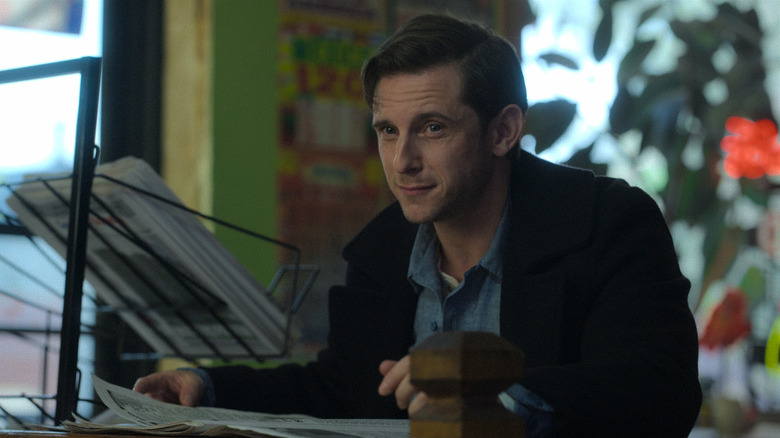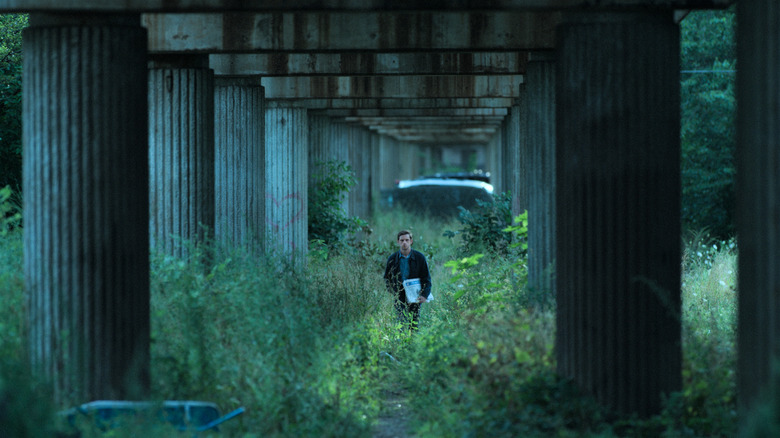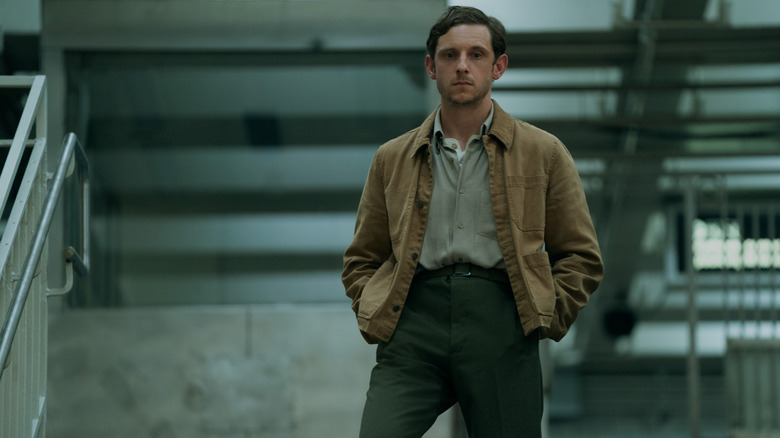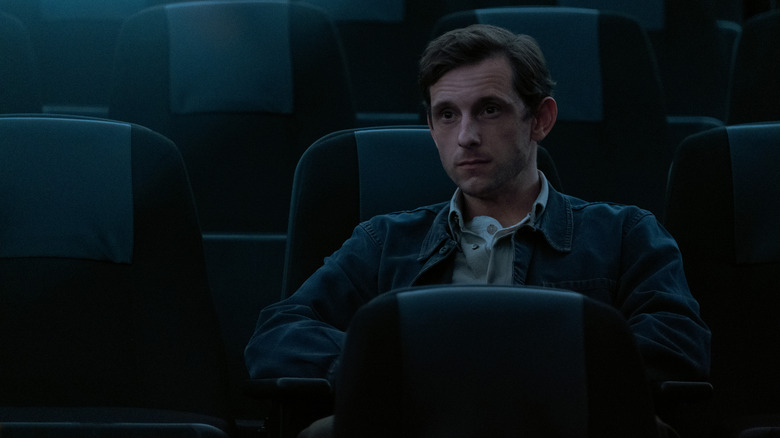Shining Girls Actor Jamie Bell On Getting Into The Head Of A Serial Killer [Interview]
You may know Jamie Bell as the good-natured protagonist from Spielberg's "The Adventure of Tintin," the hero of the AMC series "Turn: Washington's Spies," or as the title character in "Billy Elliot." But in the new Apple TV+ mystery series "Shining Girls," Bell swings to the complete other end of the spectrum to play a creepy serial killer harboring a secret: He's seemingly able to exist across time without aging. What on earth is going on with this guy?
The show does eventually provide some clarity about Bell's character, Harper. But for several episodes, the audience is left in the dark about his methods and motivations. That pacing proved to be a bit of a challenge to the actor, and as he told us during a recent roundtable interview, it was "tricky" for him to find the balance of not giving away too much too soon.
Although the series is based on Lauren Beukes' novel, meaning the answers about his character are technically out there to stumble upon, I found that a big draw for this show was guessing and speculating about how Harper does what he does and what his connection is with Kirby (Elisabeth Moss). While the first three episodes of the show are available now, those answers aren't revealed until later in the series — but Bell talks openly about those revelations in our interview below. So if you're the type of viewer who would like to keep guessing, I encourage you to bookmark this and come back to it later.
Major spoilers ahead for "Shining Girls."
"I certainly don't think he would describe himself as a deranged sociopath, but then again, not many deranged sociopaths do"
How do you think Harper would describe himself? And what was your way in? How do you understand him to be?
He'd probably describe himself as an up-and-comer. If he's being bluntly honest about it, I think he would kind of say the world hasn't really been good to him. That he's more deserving of the things that he has. But I think he's also someone who's kind of always trying to make a quick buck. He's trying to make a lucky break. I certainly don't think he would describe himself as a deranged sociopath, but then again, not many deranged sociopaths do. I think he sees that the world is out to get him and that the world kind of owes him one, in a way. He likes to think of himself as a strong man. He likes to think of himself as someone who has experienced things that validates him as a male, like war or combat or the honor of serving in a military. But I don't think he holds any of those things valuable to his heart. I think how he would describe himself is completely different to what he is, of course. He would never admit the truth. But yeah, I think if he was honest, I think he thinks the world owes him something. Because he's coming back to America at a time, during the Great Depression, which we don't really focus any time on that [in the show], but that's the world that he's inhabiting, which is like, "Well, there is nothing for me. I don't get a good shot at this. I did go and do this thing, during the war, and now what? Now what chance do I have? And so now, someone owes me something." I had to really start with that, as a character. That's just kind of where it went to in the end, but I think that's probably what he would say. "It's just never f****** easy for me," is probably what he would say.
"It's thrilling. It's like a drug. He just can't put it down. He has to have it"
Congratulations on playing creepy, because you nailed it. How did you approach that element of the character?
To kind of not play him as creepy, really. If the scene required that, it was to try and find something else to do. It was like, if he's meant to be creepy and intimidating and scary, then for me, I should play it like it's a meet-cute or it's a romantic scene or it's a fantasy or it's a dream, or just find something else to play. I think when you start kind of going, "I need to be creepy now," that's when it kind of starts to not feel so creepy. I was very fortunate to also work with just great directors on this. Michelle and Daina and Elisabeth are just so fantastic and so giving, and so allowing for me to kind of be stupid and crazy. And that was great. I felt very fortunate to be in such good hands, in that sense.
We learn more about your character as the show progresses. But since he's so mysterious for the first few episodes, did you find it challenging to calibrate your performance in a way where you didn't give away too much too soon?
Yeah, a little bit. Yeah. And also just in terms of doing the show in the first place, because when you read it you're kind of like, "Okay, I get it. He's the villain." It's kind of clear up front. And he has some eccentricities, and there's everything else, but I don't really know what the heart of him is. I don't know what the foundation of him is. So Silka and Michelle gave me [scripts for] later episodes, which I don't even think were completed at that time. Just kind of outlines of ideas. I mean, I knew that the novel was there and I could kind of rely on that as something, but our character is a little different to what the character is in the book. So yeah, it was tricky. I think the first kind of episode or two, I did kind of feel a little bit at sea, in terms of, "What do I have to hang onto here? What do I have to kind of plant him in the ground?" So I just kind of messed with the idea of control. That's the thing that compels him. That's the compulsion. The gratification is seeing these women terrified for their lives. That excites him. It's thrilling. It's like a drug. He just can't put it down. He has to have it. So just playing with that, I guess, to understanding where that comes from, it'd be where that emanates from. I think we all have a kind of morbid fascination with what makes these people do these kinds of things. I guess, for me, that was the kind of journey of making this, was like, could I have a better understanding of why someone maybe does this?
"The idea that things just happen randomly is terrifying"
I just wondered if you could talk about how you balanced what part you drew from the book, versus a script, versus brought in of your own creativity.
I mean, I loved the book. I thought the book was really compelling and interesting, and obviously certain characters really — I think Dan is probably the most different from the book, the character that Wagner plays. I think he's different in our show than he is in the book. But there's lots in the book that was really great. And [author] Lauren [Beukes] gave me a copy of her book, and she wrote this incredible inscription that I'm desperately trying to remember because it would make her sound very clever. And she is very clever, obviously, but I've forgotten what it is. She wrote in this book, which is kind of this idea that he needs control over everything because the idea that things just happen randomly is terrifying. It's the idea that things are set in stone and you can control them and bend and change at your will. That's kind of like the power of a god or something. It really is this incredible ability, when you think about it. And the idea that it might just all be actually random and that you don't have control even over yourself — which he doesn't have control over himself — is just terrifying to him. I thought that was such an interesting inscription for her to put in the book, and I hope it's okay that I even said that because it's personal. But there was lots of stuff that I took from the book. One thing I didn't take from the book was that he's handsome, because there was very little I could do about that. (laughs) And because I played him, we kind of did need to change — there's almost a suaveness to him in the book. There's also a very immediate viciousness in the book that, because the book has the ability to see things from his point of view, you could have that. Whereas in the show, we're experiencing Harper through other people, mainly. It's how [Wagner] finds him or how Elisabeth finds him or how Phillipa is engaging with him. It's kind of a different way into the character, what you're experiencing. So we had to modify and change it a little bit. But this is just a study in behavior for me, really. I was more interested in what he does when he's alone, more than anything. But we don't really have time for that.
When you're exploring such darkness at work, how hard is that to leave behind when you get home?
I always think I'm so great — not great at it, but it's so easy. You just clock off. That's that. You can always tell from the people around you, because they'll tell you, "You're a little bit this," or, "Can you just relax please?" or whatever. But I think it was okay. I mean, I use a lot of music to kind of get into [character] and just to find things, where things should sit. So I would listen to a lot of music. But the physical stuff was genuinely hard to do. It was less about is it hard to get away from, and it was more it's hard to get into. Some of the physical stuff, especially, was really — I've never really had that sensation of, "Oh no, I actually just genuinely don't think I can do this." Usually I'll just kind of jump off a cliff and go, "I don't know. How was it? Who knows? You never know." But the physical stuff specifically, because when you read physical violence or physical stuff in scripts, you just immediately go to, "Well, that's a stunt, and that's either not me or it's really rehearsed." But violence like this is so different, because it's centered in a much different place. This is like gratification for someone. This is excitement. This is thrilling. This is intimate, almost in a sexual kind of way. And on this show, that's the way we kind of looked at these scenes. It was like, "Now this should be treated almost the same as a sex scene or something. This is really, really profoundly intimate." And so we did. So that stuff, it was more hard to get into, and I was very happy to leave that stuff behind.
The first three episodes of "Shining Girls" are now streaming on Apple TV+.



